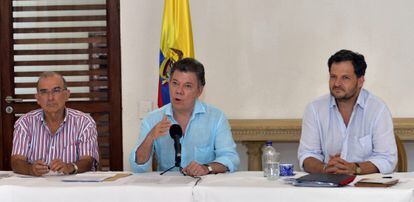FARC ceasefire remains intact two weeks on, says Colombian leader
Santos announces change in approach after advancements in peace negotiations

One of the major issues that has hampered the peace talks between the Revolutionary Armed Forces of Colombia (FARC) rebels and the Colombian government are the ongoing attacks in the jungles by both the guerrillas and the army. But that could all change following the unilateral ceasefire announced last month by the FARC.
President Juan Manuel Santos confirmed on Monday that for the moment the ceasefire remained intact. “We must acknowledge that the FARC has complied with this point,” he said.
Representatives from the FARC and the Santos administration have for the past two years been holding private discussions in Havana over a six-point peace plan, but have made little headway in reaching a final agreement.
After three days of meetings with his negotiating team and international experts in Cartagena de Indias, Santos said his government would now “move more quickly to finding the road to peace.”
Santos said his government would now “move more quickly to finding the road to peace”
“Until now we have followed that key principle made famous by former Israeli Prime Minister Isaac Rabin who said that you had to negotiate as if there was no war or conflict, and maintain the military offensive as if there was no peace process. But the advancements made in the negotiations have shown us that there are now other circumstances, and that this disconnection from reality cannot continue,” Santos told reporters without further explaining the changes in his policy.
Among the experts meeting with Santos were William Ury of Harvard University and Joaquín Villalobos, a former member of the guerrilla movement in El Salvador.
In November, the talks were put on hold after FARC rebels kidnapped an army general before releasing him two weeks later. Then came the rebels’ announcement of the unilateral ceasefire, which went into effect on December 20.
Santos also invited members of the National Liberation Army to join in the ceasefire
While Santos praised the move, he has rejected some of the conditions laid down by the rebels, such as pledging to rearm if they are attacked by the army. The president said that the peace process had to strengthen, not weaken, the security of all Colombians and that his government would “take all the necessary measures” to ensure this was so.
He also invited members of another rebel group, the National Liberation Army (ELN), to join in the FARC ceasefire. In June, just before his re-election, Santos announced that his government was exploring all possibilities to start peace talks with the ELN, but no advances have been made since then.
No date has yet been set for the FARC and the government to return to the negotiating table in Havana following a break for the Christmas holidays.










































